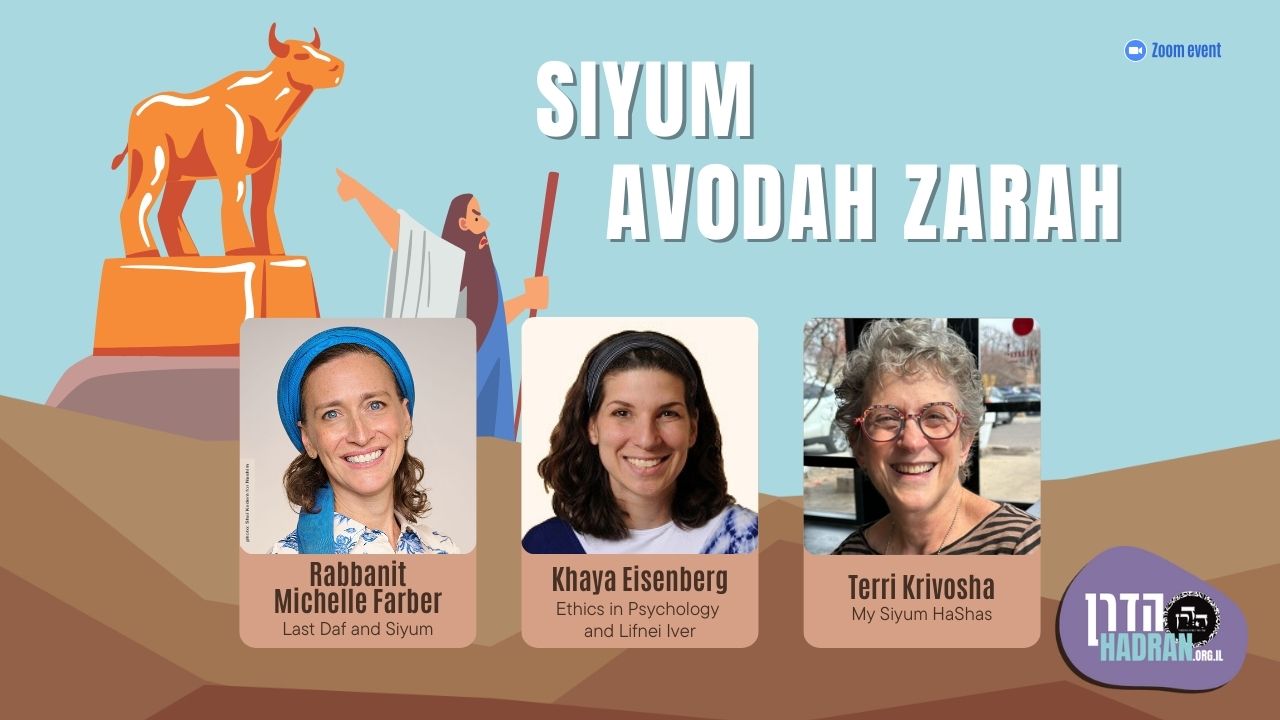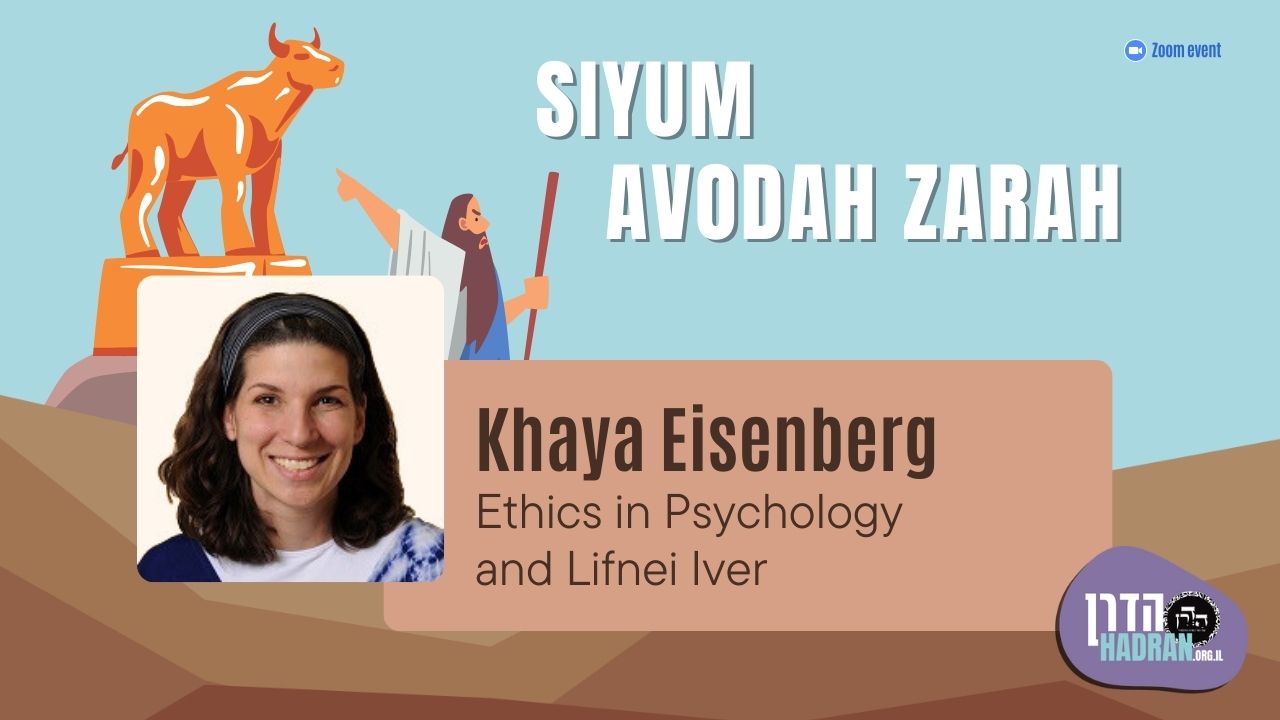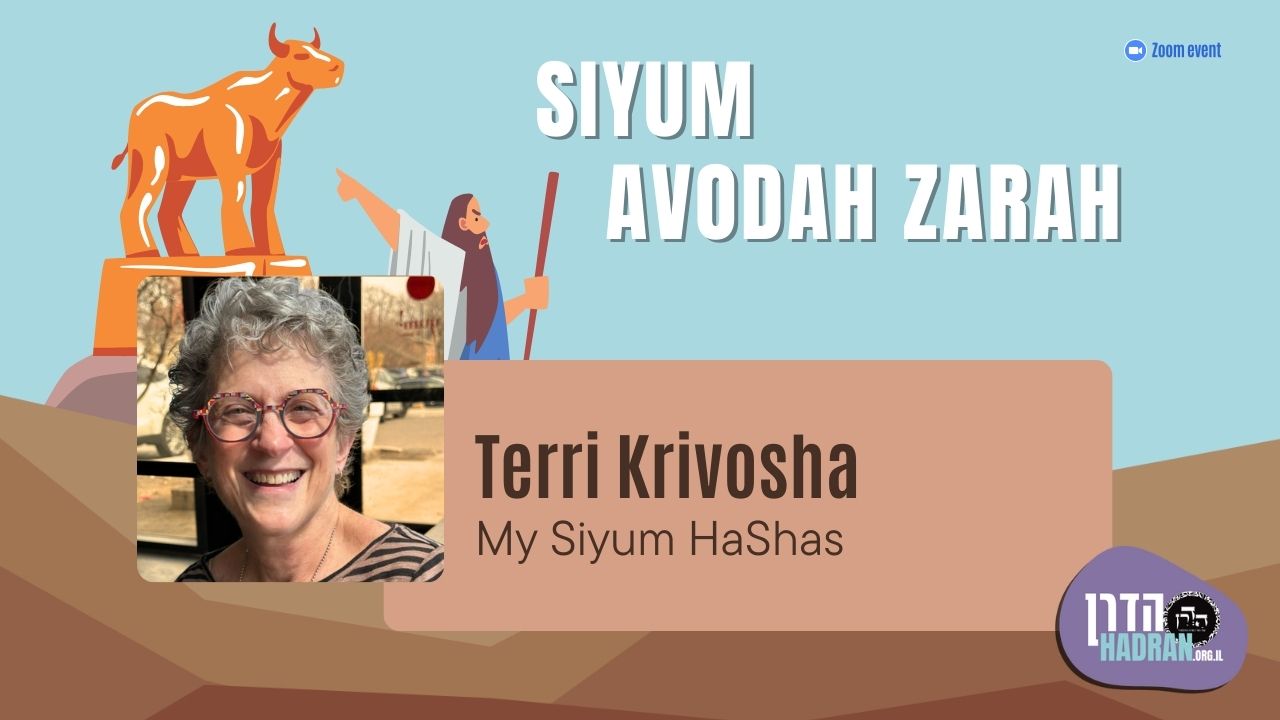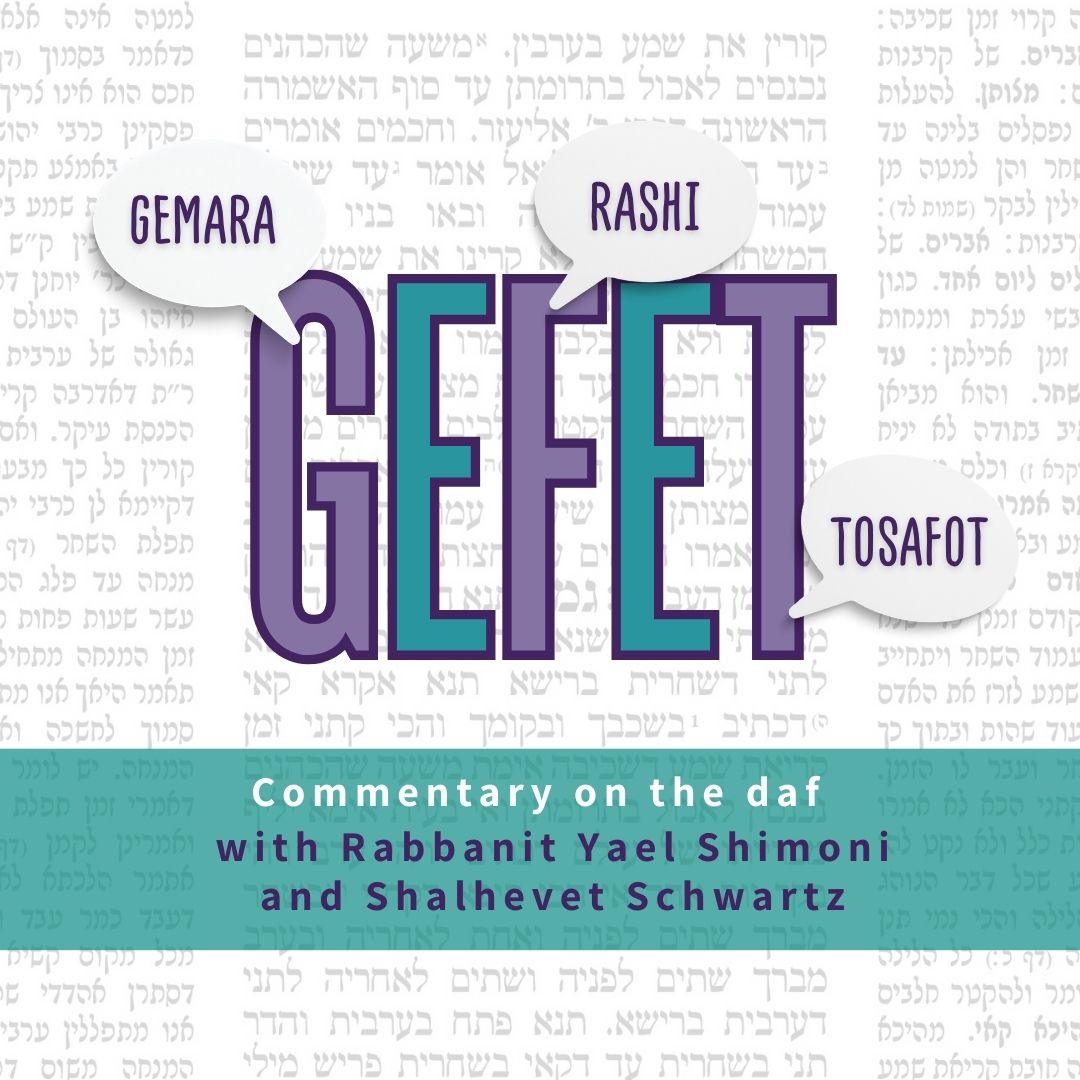Masechet Avodah Zarah
Masechet Avodah Zarah is sponsored by the Talmud class of Congregation Beth Jacob in Redwood City, CA, in honor of the Hadran staff who make learning possible.
Want to dedicate learning? Get started here:

Today’s daily daf tools:
Masechet Avodah Zarah
Masechet Avodah Zarah is sponsored by the Talmud class of Congregation Beth Jacob in Redwood City, CA, in honor of the Hadran staff who make learning possible.
Today’s daily daf tools:
Delve Deeper
Broaden your understanding of the topics on this daf with classes and podcasts from top women Talmud scholars.
New to Talmud?
Check out our resources designed to help you navigate a page of Talmud – and study at the pace, level and style that fits you.
The Hadran Women’s Tapestry
Meet the diverse women learning Gemara at Hadran and hear their stories.
Avodah Zarah 64
אֲבָל עוֹקְרִין עִמּוֹ, כְּדֵי לְמַעֵוטי אֶת הַתִּיפְלָה.
but one may uproot diverse kinds with him, in order to reduce impropriety.
סַבְרוּהָ: הָא מַנִּי? רַבִּי עֲקִיבָא הִיא, דְּאָמַר: הַמְקַיֵּים בְּכִלְאַיִם לוֹקֶה. דְּתַנְיָא: הַמְנַכֵּשׁ וְהַמְחַפֶּה בְּכִלְאַיִם לוֹקֶה, רַבִּי עֲקִיבָא אוֹמֵר: אַף הַמְקַיֵּים.
The Sages initially assumed that in accordance with whose opinion is this baraita? It is in accordance with the opinion of Rabbi Akiva, who says that not only one who sows or grows diverse kinds, but even one who maintains diverse kinds, is flogged. As it is taught in a baraita: One who removes the weeds interfering with the growth of the plants or who covers up the seeds of diverse kinds with earth is flogged. Rabbi Akiva says: Even one who maintains them instead of actively uprooting them is flogged.
מַאי טַעְמָא דְּרַבִּי עֲקִיבָא? אָמַר קְרָא: ״שָׂדְךָ לֹא תִזְרַע כִּלְאָיִם״, אֵין לִי אֶלָּא זוֹרֵעַ, מְקַיֵּים מִנַּיִן? תַּלְמוּד לוֹמַר: ״לֹא כִּלְאַיִם״.
The Gemara asks: What is the reasoning of Rabbi Akiva? The Gemara answers: The verse states: “You shall not sow your field with diverse kinds of seed” (Leviticus 19:19). I have derived only the case of one who sows. From where is it derived that one who maintains diverse kinds also receives lashes? The verse states: “Not…diverse kinds of seed,” indicating that there should not be diverse kinds in one’s field.
וְאִילּוּ לְמַעוֹטֵי תִּיפְלָה — שְׁרֵי.
The Gemara concludes its support for the opinion of Rav Naḥman: It is prohibited to maintain diverse kinds, but nevertheless, if one wishes to maintain diverse kinds temporarily in order to be paid for uprooting them, thereby reducing impropriety, it is permitted. Similarly, it is permitted for one to receive payment for breaking barrels of wine used for a libation.
לָא, הָא מַנִּי? רַבָּנַן הִיא.
The Gemara rejects this explanation: No, in accordance with whose opinion is this baraita, which deems it permitted for one to uproot diverse kinds with a gentile? It is in accordance with the opinion of the Rabbis, who permit one to maintain diverse kinds, but prohibit one from maintaining wine used for a libation, so there is no proof from this baraita in support of Rav Naḥman’s opinion.
אִי רַבָּנַן, מַאי אִירְיָא עוֹקְרִין? אֲפִילּוּ קַיּוֹמֵי נָמֵי שַׁפִּיר דָּמֵי! הָכָא בְּמַאי עָסְקִינַן? כְּגוֹן דְּקָא עָבֵיד בְּחִנָּם, וְרַבִּי יְהוּדָה הִיא, דְּאָמַר: לִיתֵּן לָהֶם מַתְּנַת חִנָּם אָסוּר.
The Gemara asks: If the baraita is in accordance with the opinion of the Rabbis, why does the tanna specifically permit uprooting with a gentile? Even maintaining the diverse kinds is permitted. The Gemara answers: Here we are dealing with a case where he performed the uprooting unpaid, and it is in accordance with the opinion of Rabbi Yehuda, who says that giving an unpaid gift to a gentile is prohibited.
מִדְּרַבִּי יְהוּדָה נִשְׁמַע לְרַבִּי עֲקִיבָא, לָאו אָמַר רַבִּי יְהוּדָה: אָסוּר לִיתֵּן לָהֶם מַתְּנַת חִנָּם, אֲבָל לְמַעוֹטֵי תִּיפְלָה שַׁפִּיר דָּמֵי. לְרַבִּי עֲקִיבָא נָמֵי, אַף עַל גַּב דְּאָמַר רַבִּי עֲקִיבָא: הַמְקַיֵּים בְּכִלְאַיִם לוֹקֶה, לְמַעוֹטֵי תִּיפְלָה שַׁפִּיר דָּמֵי. וְתוּ לָא מִידִּי.
The Gemara reasons that Rav Naḥman’s ruling can in any event be proven from this baraita: From the opinion of Rabbi Yehuda we may understand the halakha according to the opinion of Rabbi Akiva. Doesn’t Rabbi Yehuda say that it is prohibited to give a gentile an unpaid gift, but to reduce impropriety he holds that it is permitted to work with a gentile? The same can be said according to Rabbi Akiva as well: Although Rabbi Akiva says that one who maintains diverse kinds is flogged, he presumably holds that if the purpose is to reduce impropriety, it is permitted. The Gemara concludes: And nothing more is to be said on this matter.
הֲדוּר יָתְבִי וְקָמִבַּעְיָא לְהוּ: דְּמֵי עֲבוֹדָה זָרָה בְּיַד גּוֹי, מַהוּ? מִי תּוֹפֶסֶת דָּמֶיהָ בְּיַד גּוֹי, אוֹ לָא?
§ Rav Naḥman, Ulla, Avimi bar Pappi, and Rabbi Ḥiyya bar Ami were sitting again and a dilemma was raised before them: With regard to the proceeds from the sale of an object of idol worship that are in the possession of a gentile, who sold the object to another, what is the halakha? Does the object of idol worship transfer its forbidden status to the money that is in the possession of a gentile, as it would to money in the possession of a Jew, or not?
אֲמַר לְהוּ רַב נַחְמָן: מִסְתַּבְּרָא דְּמֵי עֲבוֹדָה זָרָה בְּיַד גּוֹי מוּתָּרִין, מִדְּהָנְהוּ דַּאֲתוֹ לְקַמֵּיהּ דְּרַבָּה בַּר אֲבוּהּ, אֲמַר לְהוּ: זִילוּ זַבִּינוּ כֹּל מָה דְּאִית לְכוּ, וְתוּ אִיתְגַּיַּירוּ.
Rav Naḥman said to them: It stands to reason that the proceeds from the sale of an object of idol worship in the possession of a gentile are permitted. This may be proven from certain gentiles who came before Rabba bar Avuh to convert. Rabba bar Avuh said to them: Go sell everything that you have, including your objects of idol worship, and then come back to me to convert.
מַאי טַעְמָא? מִשּׁוּם דְּקָסָבַר: דְּמֵי עֲבוֹדָה זָרָה בְּיַד גּוֹי מוּתָּרִין. וְדִלְמָא שָׁאנֵי הָתָם, דְּכֵיוָן דְּדַעְתֵּיהּ לְאִיגַּיּוֹרֵי — וַדַּאי בַּטְּלַהּ!
What is the reason he gave this advice? Isn’t it because he maintains that the proceeds from the sale of an object of idol worship in the possession of a gentile are permitted, and therefore he suggested they sell the objects of idol worship so they could derive benefit from the money after they converted? The Gemara rejects this proof: But perhaps it is different there, as since their intention is to convert, they certainly revoked the idolatrous status of these objects, and when they sold them they were selling permitted items.
אֶלָּא מֵהָכָא: יִשְׂרָאֵל שֶׁהָיָה נוֹשֶׁה בְּגוֹי מָנֶה, וּמָכַר עֲבוֹדָה זָרָה וְהֵבִיא לוֹ, יֵין נֶסֶךְ וְהֵבִיא לוֹ — מוּתָּר, אֲבָל אִם אָמַר לוֹ: ״הַמְתֵּן לִי עַד שֶׁאֶמְכּוֹר עֲבוֹדָה זָרָה וְאָבִיא לָךְ״, ״יֵין נֶסֶךְ וְאָבִיא לָךְ״ — אָסוּר.
Rather, proof may be brought from here, as it is taught in a baraita: In the case of a Jew who was a creditor to a gentile for the amount of one hundred dinars, and the gentile sold an object of idol worship and from the proceeds brought him the payment of the debt, or sold wine used for a libation and from the proceeds brought him the payment of the debt, the money is permitted. But if the gentile said to him: Wait for me until I sell an object of idol worship and from the proceeds I will bring you the payment of the debt, or: Wait until I sell wine used for a libation and from the proceeds I will bring you the payment of the debt, this money is forbidden. This proves that the proceeds of an object of idol worship in the possession of a gentile are permitted.
מַאי שְׁנָא רֵישָׁא וּמַאי שְׁנָא סֵיפָא? אָמַר רַב שֵׁשֶׁת: סֵיפָא, מִשּׁוּם דְּהָוֵה לֵיהּ כִּי רוֹצֶה בְּקִיּוּמוֹ.
The Gemara asks: What is different in the first clause that it is permitted, and what is different in the latter clause that it is forbidden? Rav Sheshet said: In the latter clause the proceeds are forbidden because the Jew desires the preservation of the object of idol worship or wine used for a libation, since he knows that the gentile must sell it in order to repay the debt.
וְכִי רוֹצֶה בְּקִיּוּמוֹ כְּהַאי גַּוְונָא מִי אֲסִיר? וְהָתְנַן: גֵּר וְגוֹי שֶׁיָּרְשׁוּ אֲבִיהֶן גּוֹי, גֵּר יָכוֹל לוֹמַר לוֹ: ״טוֹל אַתָּה עֲבוֹדָה זָרָה וַאֲנִי מָעוֹת״, ״טוֹל אַתָּה יֵין נֶסֶךְ וַאֲנִי פֵּירוֹת״; אִם מִשֶּׁבָּאוּ לִרְשׁוּת הַגֵּר — אָסוּר.
The Gemara asks: And if he desires its preservation in a case like this, is the money forbidden? But didn’t we learn in a mishna (Demai 6:10): In the case of a convert and a gentile who inherited from their gentile father, the convert can say to his gentile brother: You take the objects of idol worship and I will take the money, or: You take the wine used for a libation and I will take the produce; but if they make this exchange after the property came into the possession of the convert, it is forbidden.
אָמַר רָבָא בַּר עוּלָּא: מַתְנִיתִין בַּעֲבוֹדָה זָרָה הַמִּתְחַלֶּקֶת לְפִי שְׁבָרֶיהָ.
Rava bar Ulla said: The ruling of the mishna is stated with regard to an object of idol worship whose value can be distributed among its shards, i.e., even if it were broken to pieces its value would remain, so the convert does not desire its preservation.
תִּינַח עֲבוֹדָה זָרָה, יֵין נֶסֶךְ מַאי אִיכָּא לְמֵימַר? בְּחֶרֶס הַדְרְיָינִי.
The Gemara asks: This resolution works out well in the case of objects of idol worship, but with regard to wine used for a libation, what is there to say? There is no situation in which the convert does not desire the preservation of the wine until the exchange. The Gemara answers: The ruling of the mishna is stated with regard to Hadrianic earthenware permeated with wine used for a libation. Since the wine can be extracted by soaking the earthenware in water, the convert does not desire that the vessel remain intact.
וַהֲלֹא רוֹצֶה בְּקִיּוּמוֹ, שֶׁלֹּא יִגָּנֵובוּ וְשֶׁלֹּא יֵאָבֵדוּ! אֶלָּא אָמַר רַב פָּפָּא: יְרוּשַּׁת הַגֵּר קָאָמְרַתְּ? שָׁאנֵי יְרוּשַּׁת הַגֵּר, דְּאַקִּילוּ בַּהּ רַבָּנַן, גְּזֵירָה שֶׁמָּא יַחְזוֹר לְקִלְקוּלוֹ.
The Gemara asks: But doesn’t he desire its preservation in the sense that it should not be stolen or lost? Rather, Rav Pappa said that there is a different resolution: You say there is a difficulty from the case of the inheritance of a convert? The inheritance of a convert is different, as the Sages were lenient with regard to it, as a rabbinic decree, lest he return to his corrupted ways if it were prohibited for him to inherit property from his father. In the case of one who is not a convert and desires the preservation of an object of idol worship, it is prohibited for him to profit from it.
תַּנְיָא נָמֵי הָכִי: בַּמֶּה דְּבָרִים אֲמוּרִים? שֶׁיָּרְשׁוּ, אֲבָל נִשְׁתַּתְּפוּ — אָסוּר.
This is also taught in a baraita: In what case is this statement, that a convert and a gentile are permitted to divide up common property that includes objects of idol worship, said? This is said with regard to property that they inherited; but if they were partners, it is prohibited.
הֲדוּר יְתַבוּ וְקָמִיבַּעְיָא לְהוּ: גֵּר תּוֹשָׁב מַהוּ שֶׁיְּבַטֵּל עֲבוֹדָה זָרָה? דְּפָלַח — מְבַטֵּיל, דְּלָא פָּלַח — לָא מְבַטֵּיל, אוֹ דִלְמָא כֹּל דְּבַר מִינֵּיהּ מְבַטֵּיל, וְהַאי בַּר מִינֵיהּ הוּא?
§ The Gemara mentions another discussion among Rav Naḥman, Ulla, Avimi bar Pappi, and Rav Ḥiyya bar Ami. They were sitting again and a dilemma was raised before them: With regard to a gentile who resides in Eretz Yisrael and observes the seven Noahide mitzvot [ger toshav], including the prohibition against engaging in idol worship, what is the halakha with regard to the possibility that he can revoke the status of objects of idol worship? Is it the case that one who worships idols can revoke the status of one, but one who does not worship them cannot revoke the status of one? Or perhaps should it be reasoned that anyone who is of the same kind as idol worshippers, i.e., a gentile, can revoke its status, and a ger toshav is of the same kind as idol worshippers?
אֲמַר לְהוּ רַב נַחְמָן: מִסְתַּבְּרָא, דְּפָלַח — מְבַטֵּיל, דְּלָא פָּלַח — לָא מְבַטֵּיל.
Rav Naḥman said to them: It stands to reason that one who worships idols can revoke the status of one, but one who does not worship them cannot revoke the status of one.
מֵיתִיבִי: יִשְׂרָאֵל שֶׁמָּצָא עֲבוֹדָה זָרָה בַּשּׁוּק, עַד שֶׁלֹּא בָּאתָה לְיָדוֹ — אוֹמֵר לְגוֹי וּמְבַטְּלָהּ, מִשֶּׁבָּאתָה לְיָדוֹ — אֵינוֹ אוֹמֵר לְגוֹי וּמְבַטְּלָהּ; מִפְּנֵי שֶׁאָמְרוּ: גּוֹי מְבַטֵּל עֲבוֹדָה זָרָה שֶׁלּוֹ וְשֶׁל חֲבֵירוֹ, בֵּין עוֹבְדָהּ וּבֵין שֶׁאֵין עוֹבְדָהּ.
The Gemara raises an objection to this ruling from a baraita: In the case of a Jew who found an object of idol worship in the marketplace, as long as it has not yet come into his possession, he can tell a gentile, and the gentile can revoke its idolatrous status. Once it has come into his possession, he cannot tell a gentile and have the gentile revoke its status. This applies to any gentile, because the Sages said: A gentile can revoke the status of his own object of idol worship or that of another gentile, whether he worships it or whether he does not worship it.
מַאי ״עוֹבְדָהּ״, וּמַאי ״שֶׁאֵינוֹ עוֹבְדָהּ״? אִילֵּימָא אִידֵּי וְאִידֵּי גּוֹי, הַיְינוּ שֶׁלּוֹ וְשֶׁל חֲבֵירוֹ! אֶלָּא לָאו ״עוֹבְדָהּ״ — גּוֹי, וּמַאי ״שֶׁאֵינוֹ עוֹבְדָהּ״ — גֵּר תּוֹשָׁב, וּשְׁמַע מִינַּהּ גֵּר תּוֹשָׁב נָמֵי מְבַטֵּל!
What is meant by the phrase: Worships it, and what is meant by the phrase: Does not worship it? If we say both this and that are referring to a gentile, this is the same as the previous statement in the baraita, that a gentile can revoke the status of his own object of idol worship or that of another gentile, i.e., an object that he worships or one that another gentile worships. Rather, isn’t it to be understood that the phrase: Worships it, is referring to a gentile? And what is the meaning of the phrase: Does not worship it? It is referring to a ger toshav, who does not worship any idols. And learn from it that a ger toshav can also revoke the status of objects of idol worship.
לָא, לְעוֹלָם אֵימָא לָךְ: אִידֵּי וְאִידֵּי גּוֹי, וּדְקָאָמְרַתְּ הַיְינוּ ״שֶׁלּוֹ וְשֶׁל חֲבֵירוֹ״: רֵישָׁא — זֶה וָזֶה לִפְעוֹר, וְזֶה וָזֶה לְמַרְקוּלִיס; סֵיפָא — זֶה לִפְעוֹר וְזֶה לְמַרְקוּלִיס.
The Gemara rejects this explanation. No, actually, I will say to you that this phrase and that phrase are both referring to a gentile, and with regard to that which you say, that this is the same as the statement concerning his object of idol worship or that of another gentile, it can be explained as follows: The first clause is referring to a case where both gentiles worship the same idol, e.g., this one and that one both worship Peor, or this one and that one both worship Mercury, and the baraita is teaching that one can revoke the status of an idol that belongs to the other. The latter clause, which distinguishes between one who worships it and one who does not worship it, is referring to a case where this one worships Peor and that one worships Mercury, indicating that an idolater can revoke the status of an idol that he does not worship at all, but only if he is himself an idolater, as opposed to a ger toshav.
מֵיתִיבִי: אֵיזֶהוּ גֵּר תּוֹשָׁב? כֹּל שֶׁקִּיבֵּל עָלָיו בִּפְנֵי שְׁלֹשָׁה חֲבֵרִים שֶׁלֹּא לַעֲבוֹד עֲבוֹדָה זָרָה, דִּבְרֵי רַבִּי מֵאִיר.
The Gemara raises an objection from a baraita: Who is a ger toshav? It is anyone who has accepted upon himself before three ḥaverim, i.e., people devoted to the meticulous observance of mitzvot, especially halakhot of ritual purity, teruma, and tithes, not to worship idols. This is the statement of Rabbi Meir.
וַחֲכָמִים אוֹמְרִים: כֹּל שֶׁקִּיבֵּל עָלָיו שֶׁבַע מִצְוֹת שֶׁקִּבְּלוּ עֲלֵיהֶם בְּנֵי נֹחַ.
And the Rabbis say: Anyone who has accepted upon himself observance of the seven mitzvot that the descendants of Noah accepted upon themselves is a ger toshav.
אֲחֵרִים אוֹמְרִים: אֵלּוּ לֹא בָּאוּ לִכְלַל גֵּר תּוֹשָׁב, אֶלָּא אֵיזֶהוּ גֵּר תּוֹשָׁב? זֶה גֵּר אוֹכֵל נְבֵילוֹת, שֶׁקִּבֵּל עָלָיו לְקַיֵּים כׇּל מִצְוֹת הָאֲמוּרוֹת בַּתּוֹרָה חוּץ מֵאִיסּוּר נְבֵילוֹת.
Others say: These have not entered the category of ger toshav. Rather, who is a ger toshav? This is a convert who eats unslaughtered animal carcasses, which are not kosher, but who has accepted upon himself to observe all of the mitzvot that are stated in the Torah except for the prohibition against eating unslaughtered carcasses.
מְיַיחֲדִין אֶצְלוֹ יַיִן, וְאֵין מַפְקִידִין אֶצְלוֹ יַיִן, וַאֲפִילּוּ בְּעִיר שֶׁרוּבָּהּ יִשְׂרָאֵל, אֲבָל מְיַיחֲדִין אֶצְלוֹ יַיִן וַאֲפִילּוּ בְּעִיר שֶׁרוּבָּהּ גּוֹיִם, שַׁמְנוֹ כְּיֵינוֹ.
The baraita continues: Whatever the definition of a ger toshav, the following halakhot apply to him: One may leave him alone with wine briefly without Jewish supervision with no concern that he might use it for a libation, thereby rendering it forbidden to Jews, as he is not an idol worshipper. But one may not deposit wine with him for an extended period of time, lest he exchange it with the wine of a gentile, which is forbidden. And this applies even in a town that has a Jewish majority. But one may leave him alone with wine briefly without Jewish supervision even in a town with a majority of gentiles. His oil is treated like his wine in terms of its permissibility.
שַׁמְנוֹ כְּיֵינוֹ סָלְקָא דַּעְתָּךְ? שֶׁמֶן מִי קָא הָוֵי יֵין נֶסֶךְ? אֶלָּא, יֵינוֹ כְּשַׁמְנוֹ.
The Gemara interjects: His oil is like his wine? Can this enter your mind? Does the oil of a gentile become, i.e., assume the status of, wine used for a libation? Rather, the baraita should be emended as follows: His wine is like his oil. It is permitted to derive benefit from it, but not to consume it.
וְלִשְׁאָר כׇּל דָּבָר הֲרֵי הוּא כְּגוֹי. רַבָּן שִׁמְעוֹן אוֹמֵר: יֵינוֹ יֵין נֶסֶךְ, וְאָמְרִי לַהּ מוּתָּר בִּשְׁתִיָּה.
The baraita continues: And with regard to all other matters, a ger toshav is treated like a gentile. Rabban Shimon says: His wine is treated like wine used for a libation. And some say he says: Even drinking it is permitted.
קָתָנֵי מִיהָא: וְלִשְׁאָר כׇּל דְּבָרָיו הֲרֵי הוּא כְּגוֹי. לְמַאי הִלְכְתָא? לָאו דִּמְבַטֵּל עֲבוֹדָה זָרָה כְּגוֹי? אָמַר רַב נַחְמָן בַּר יִצְחָק: לֹא, לִיתֵּן רְשׁוּת וּלְבַטֵּל רְשׁוּת.
The Gemara comments on the baraita: In any event, the baraita teaches: And with regard to all other matters, a ger toshav is treated like a gentile. With regard to what halakha is this stated? Is it not teaching that he can revoke the status of an object of idol worship as a gentile can? Rav Naḥman bar Yitzḥak says: No, it is stated with regard to giving away rights in a domain or renouncing rights in a domain in the context of the halakhot of joining houses in courtyards for Shabbat.
וְכִדְתַנְיָא: יִשְׂרָאֵל מְשׁוּמָּד מְשַׁמֵּר שַׁבַּתּוֹ בַּשּׁוּק — מְבַטֵּל רְשׁוּת, שֶׁאֵין מְשַׁמֵּר שַׁבַּתּוֹ בַּשּׁוּק — אֵין מְבַטֵּל רְשׁוּת, מִפְּנֵי שֶׁאָמְרוּ: יִשְׂרָאֵל נוֹתֵן רְשׁוּת וּמְבַטֵּל רְשׁוּת.
And this is as it is taught in a baraita: An apostate Jew who nevertheless observes his Shabbat in the marketplace, i.e., in public, can renounce his rights in a shared domain so the other Jews in the domain may carry in it on Shabbat, but an apostate who does not observe his Shabbat even in the marketplace cannot renounce his rights in a domain, because the Sages said that only a Jew can give away rights in his domain or renounce his rights in his domain, and this applies in the context of joining houses in courtyards on Shabbat.
וּבְגוֹי — עַד שֶׁיִּשְׂכּוֹר. כֵּיצַד? אוֹמֵר לוֹ: ״רְשׁוּתִי קְנוּיָה לָךְ״, ״רְשׁוּתִי מְבוּטֶּלֶת לָךְ״ — קָנָה, וְאֵין צָרִיךְ לִזְכּוֹת.
But with regard to a gentile, this is not effective unless the Jew leases his domain in the courtyard. How so? A Jew may say to another Jew: My rights in this domain are hereby acquired by you, or: My rights in this domain are hereby renounced to you, and the other Jew thereby acquires those rights, and it is not necessary for him to take possession of it through a formal act of acquisition.
רַב יְהוּדָה שַׁדַּר לֵיהּ קוּרְבָּנָא
The Gemara relates: Rav Yehuda sent a gift






























